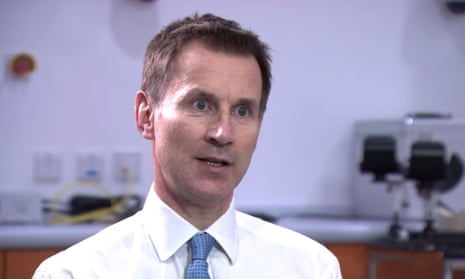Jeremy Hunt has said that performance in some parts of the NHS is “completely unacceptable”.
The health secretary said there was “no excuse” for some of the problems being seen in the health service and that some of the care being offered was not what anyone would want for their family.
His remarks, in an interview with the BBC, came after official figures for December and leaked January statistics for waiting times in England showed consecutive months of the worst delays in A&E since a four-hour target was introduced 13 years ago.
Earlier, one of his key advisers, Patrick Carter, had said that hospitals were under such extreme pressure that they were in a state of war.
On Thursday figures emerged showing that the number of A&E patients seen within the target of four hours fell to a record low of 86% in England in December, while those waiting longer than 12 hours to be admitted to a hospital bed doubled to more than 2,500 in 2016. The leaked January figures suggested a worse performance on A&E waiting times, with NHS England meeting its four hour target in 82% of cases.
The number of people waiting more than two months to start cancer treatment after an urgent referral was at a record high of 25,157 in 2016, and the proportion of patients receiving hospital treatment within 18 weeks fell below 90% for the first time since 2011.
Hunt said there was already a “big transformation programme” under way in the NHS with the aim of treating more people at home or in the community to ease burdens on hospitals.
But he said the changes would take time and said progress had been “disappointingly slow” in some areas.
“It is incredibly frustrating for me,” said the health secretary. “I am doing this job because I want NHS care to be the safest and best in the world. That kind of care is completely unacceptable. No one would want it for members of their own family.”
He said there were no excuses for cases such as that of 89-year-old Iris Sibley, who was stuck on a hospital ward at Bristol Royal Infirmary for more than six months because a nursing home place could not be found for her.
“It is terrible for Mrs Sibley but it is also very bad for the NHS,” Hunt said.
He insisted the government was addressing problems in the social care system which are preventing many elderly and frail patients from being discharged from hospital – so-called “bed-blocking”.
Hunt added: “The prime minister has been very clear: we recognise the pressure’s there. We recognise there is a problem about the sustainability of the social care system. That has to be addressed and we are going to do that.”
Barrister Sir Robert Francis, whose 2013 report uncovered poor care in Mid Staffordshire, said the NHS was facing an “existential crisis” which made a further similar scandal inevitable.
Francis, a non-executive director at the Care Quality Commission, told the Health Service Journal there was an “increasing disconnect” between what is said nationally about the NHS and “what people on the ground feel or see is going on”.
“Let’s make no bones about it, the NHS is facing an existential crisis,” he said. “The service is running faster and faster to try and keep up and is failing, manifestly failing.
“The danger is that we reach a tipping point; we haven’t reached it yet, but there will come a point where public confidence in the service dissipates.”

Comments (…)
Sign in or create your Guardian account to join the discussion